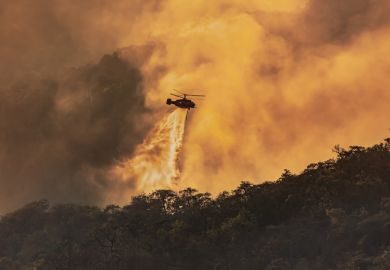For every barrel of oil we find, we consume four. C. J. Campbell considers the prospect of a new oil crisis to rival that of the early 1970s.
We all remember the oil shocks of the 1970s and the dire warnings of the Club of Rome. Visitors to hotels were stumbling along darkened corridors in an energy crisis, but then it all went away. Our fears evaporated and economists told us that market forces reigned supreme and that technology had come to our rescue. But there remains in the back of our minds some sneaking doubts that perhaps there was some truth in the notion of resource constraints. With rising petrol prices we begin to wonder again if all is well.
To start at the beginning, we should note that man or his immediate ancestor swung down from the trees about four million years ago and various human sub-species lived sustainably on the planet until about 1850.Then came Hydrocarbon Man, eventually to replace all others, and the population expanded six-fold exactly in parallel with oil production. Our planet has been subject to continual change throughout geological time. Its climate has fluctuated greatly due to galactic forces; changes in ocean currents from differing plate-tectonic configurations, volcanic eruptions and perhaps collisions with objects from outer space. Only 10,000 years ago, Europe was at the edge of an icecap, while people painted reindeers on cave walls in southern France.
Questions are now being asked about how long Hydrocarbon Man will survive before he joins other extinct species in the fossil record that became too specialised to adapt to environmental changes. It is asked if man himself is responsible for the present phase of global warming.
Two valuable new books contribute to this debate, but miss what is perhaps the most important point, namely that we are within a few years of the peak of oil production because discovery peaked in the 1960s. We now find one barrel for every four we consume as we eat into our geological inheritance. Furthermore, the share of production coming from just five Middle East countries is inexorably rising, bringing back the situation that allowed them to control the price of oil in the 1970s. This time it will not be a short-lived crisis. Nature and Middle East control of supply may yet intervene to protect the planet from man's excesses.
The first book, Managing the Oil Wealth by Jahangir Amuzegar, is a scholarly and heavily researched account of how the members of the Organisation of Petroleum Exporting Countries, the principal rentiers of oil wealth, managed their windfall or rather how they failed to do so. The book mainly covers the period since the oil shocks of the 1970s, emphasising how the dire world economic predictions of the time were misplaced or at least seemed to be.
The author evaluates in depth how each of the 13 Opec countries dealt with both the windfall of the early 1970s, when oil prices soared, and the agony of subsequent price collapses, providing a very thorough review. It is a reference book rather than a work
that can be easily read from cover to cover; and it is an economist's book that does not particularly address the underlying political factors. For example, the consequences of the Gulf war are evaluated but little is said about its actual causes. We are not told if Iraq was justified in its complaint that Kuwait's failure to respect its agreed production quota was an assault upon Iraq's legitimate revenue; nor does the book elaborate the degree to which US policy influenced the decision to invade, or contributed to the collapse in oil prices in 1985.
The book presents a sad story of ineptitude, lost opportunity and general corruption. The instant wealth that oil brought transformed what had been simple but sustainable societies. It induced surges of population, including the entry of large expatriate work forces - a further source of instability. The book also evaluates inordinate state power, investment priorities, hasty commitments, a flawed thrust to industrialisation, the lack of coordination, excessive defence expenditures and what is described as petro-culture, characterised as "easy money, reduced financial discipline within the bureaucracy, careless budgetary allocation, waste, unsavoury practices and widespread corruption". However, the author is less secure when assessing the world resource base or depletion, which are critical subjects for Opec. He cites for example the flawed notion of reserve lifespan as quoted in years on the basis of reserve-to-production ratio (taken from the misleading information published in the BP Statistical Review of World Energy ).
Opec is likely to disintegrate as depletion proceeds - already Gabon and Ecuador have quit, and Indonesia cannot be far behind as it becomes a net importer. Yet, the five Middle East core members will soon face another windfall as prices again soar from their growing share of the market. It will not be a rerun of the short-lived shocks of the 1970s but something entirely new and much more serious. The challenges facing these countries in managing their control will be more severe. They further face a possible military threat from powerful countries who may demand access to their oil in times of growing shortage.
Nevertheless, this is a valuable and well-written book for serious economists, historians and policy-makers wanting to understand the last chapter of oil before it reaches its peak, which in turn is critical background for the coming transition to decline. The Opec countries could benefit from this introspection too.
The second book, The Carbon War: Dispatches from the End of the Oil Century by Jeremy Leggett, is a very different piece. It is the work of a Green activist, describing a David and Goliath struggle with the evil empire of oil. It gives a blow-by-blow account of the great climate debate in a very readable style. We come to know the actors, the baddies and the goodies, with much colourful dialogue.
But we wonder if the activists are not more concerned with the passion of their self-proclaimed mission than a realistic assessment of either the scientific basis of their cause or the practical feasibility of the proposed remedies. Oil companies are vilified as profiteers, forgetting that their directors have a fiduciary duty to deliver dividends. Planning the future of the world is not their job. Besides, oil companies would not sell oil unless the mindless consumer bought it.
The book summarises the essence of the climate concern in a few short paragraphs, explaining that the carbon content of the atmosphere was about 580 billion tons throughout the geological past, but has now risen to 750 billion. A further increase of 200 to 300 billion tons could cause a fundamental change in climate. The models are, however, unsure because no one knows the rate at which other counter-processes to fix the carbon might kick in. The author urges us to accept a worst-case scenario as if we faced a military threat. He may very well be right.
We can sympathise with dedicated lobbyists who seek to change the world and impose their will upon it, but do they undermine the democratic process? Consumers may prefer to consume, whatever the consequences for the unborn generations or the Pacific atoll, sinking beneath the waves. Our simplest actions have unseen effects. Buying a pair of shoes may encourage child labour in Delhi, destroying the life of our village cobbler. Should governments lead or follow their electors? There is also the risk of lobbyists supporting a flawed cause, as in the famous case of the Brent Spar, touched on in the book. When the full energy account is compiled, this might have posed much less of an environmental threat in the ocean depths than arose from its ultimate fate.
The book is a good guide to lobbying: how to identify and outsmart the opposition; how to move in with the telling word; how to play on emotions; how to manipulate the inertia of committees; and above all how to sing to the media in the gallery. We can gladly excuse the author his ego trip as he interviewed Yuri the Inuit in Siberia in the light of gas flares from neighbouring wells or took his place with the high and the mighty in the councils of the world. There is much theatre.
The outcome of the 72 described meetings was the yet-to-be ratified Kyoto treaty. It carries the curious notion of trading obligations, whereby an offender can buy the contribution of a performer, and it fails to provide enforceable penalties. It does not sound too real.
The epilogue is revealing. The warrior comes home to be a capitalist in his own right, marketing solar roofs with the help of Swiss bankers. He sees the defeat of his enemies as the major oil companies collapse into merger and start paying at least lip service to renewable energy. Even so, he still fears that Exxon, Mobil, Texaco, and other unrepentant thugs of the corporate world, will continue to sign the cheques that bankroll the Carbon Club\'s "crimes against humanity" - strong words indeed.
The oil age is 150 years old and now just about half over. We have consumed about 820 billion barrels of the 1,800 billion readily available to us. The great social struggles of capitalism, socialism and communism that sought an equitable reward from this abundant energy have run their course, leaving a global economy seemingly bent on concentrating wealth. It may turn out to be virtual wealth as the fuel that drives it becomes first expensive and then in short supply.
We are now on the cusp, as oil production peaks. Population, too, may peak not long after oil for not wholly unrelated reasons, agriculture being heavily dependent on petroleum for synthetic nutrients and water supply.
What goes up must come down, and in the 21st century we will have to deal with the downside. It is logical for environmentalists to predict apocalypse. Yet there is much that we could do to ameliorate the transition to a leaner economy based on renewable energy. These two books in their different ways will help us understand our predicament.
C. J. Campbell is a partner with Petroplan, a consultancy that specialises in petroleum forecasts and depletion analysis. He is the author of The Golden Century of Oil and The Coming Oil Crisis .
Managing the Opil Wealth: Opec's Windfalls and Pitfalls
Author - Jahangir Amuzegar
ISBN - 1 86064 292 6
Publisher - Tauris
Price - £45.00
Pages - 266
Register to continue
Why register?
- Registration is free and only takes a moment
- Once registered, you can read 3 articles a month
- Sign up for our newsletter
Subscribe
Or subscribe for unlimited access to:
- Unlimited access to news, views, insights & reviews
- Digital editions
- Digital access to THE’s university and college rankings analysis
Already registered or a current subscriber? Login



